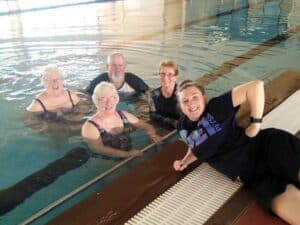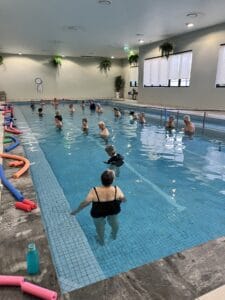Multiple sclerosis (MS) is a chronic autoimmune which primarily affects women and young adults (Halabchi et al., 2017). It is a demyelinating disease of the CNS which is characterised by inflammation, axonal demyelination, transaction and neurodegeneration (Halabchi et al., 2017; Learmonth et al., 2017).
Individuals who are diagnosed with multiple sclerosis can have the following symptoms (Halabchi et al., 2017; Padgett & Kasser, 2013):
- Challenges to daily function
- Muscle weakness
- Ataxia
- Tremor
- Spasticity
- Paralysis
- Mobility restrictions
- Balance disorder
- Cognitive impairment
- Decreased physical activity levels
- Increase falls risk
- Physical decline
- Impaired speech and swallowing
- Sensory deficits
- Bladder and bowel dysfunction
- Pain
- Fatigue
- Depression
- Family and community participation
Persons with MS also have reduced physical activity and this is possibly due to the fear of worsening symptoms with physical activity. The effects of this results in an increase in disability and decreases in fitness, quality of life and muscle strength (Halabchi et al., 2017).
Exercise has been shown to be beneficial for MS as it can improve functional capacity, quality of life, modifiable impairments and physical fitness (Halabchi et al., 2017). Through supervised and individualised exercise prescriptions the effects of exercise can increase aerobic and functional capacities however research is still required for specific exercise intensities (Bansi & Kesselring, 2015).
Mild- moderate symptom persons with MS can tolerate exercise which will lead to an increase in strength, mobility related quality of life and mood. This exercise is best delivered through a supervised prescription which includes balance, strength and aerobic exercises. There was no effects for decreasing fatigue or perception of disability but it does help to improve fitness and quality of life. The current recommendation from Padgett & Kasser, (2013) is 30-60minutes, 2-3 times per week for 8-12 weeks of supervised exercise.
Progressive relapsing MS is a much more aggressive form of MS which can tolerate exercise when provided under supervision (Padgett & Kasser, 2013; Pilutti & Edwards, 2017).
The current recommendations for a persons with MS regarding exercise are to (Halabchi et al., 2017):

Accredited Exercise Physiologists undergo training to provide individualised exercise prescriptions to persons with MS. To learn more about how exercise can benefit yourself or a friend with MS, please get in touch with our Accredited Exercise Physiologists at MET Phys on 0745 993 165.
References
Bansi, J., & Kesselring, J. (2015). Exercise and Sports Therapy in Multiple Sclerosis. Duetsche Zeitschrift Fur Sportmedizin, 66, 308-312.
Halabchi, F., Alizadeh, Z., Sahralan, M. A., Abolhasani, M. (2017). Exercise prescription for patients with multiple sclerosis; potential benefits and practical recommendations. BMC Neurology, 17(185), 1-11.
Learmonth, Y. C., Adamson, B. C., Balto, J. M., Chui, C., Molina-Guzman, I. M., Finlayson, M., Riskin, B. J., & Moti, R. W. (2017). Identifying preferred format and source of exercise information in persons with multiple sclerosis that can be delivered by health-care providers. Health Expectations, 20, 1001-1010.
Padgett, P. K., & Kasser, S. L. (2013). Exercise for Managing the Symptoms of Multiple Sclerosis. Physical Therapy, 93(6), 723-728.
Pilutti, L. A., Paulseth, J. E., Dove, C., Jian, S., Rathbone, M., Hicks, A. (2016). Exercise Training in Progressive Multiple Sclerosis: A Comparison of Recumbent Stepping and Body Weight-Supported Treadmill Training. International Journal of MS Care, 18, 221-229.
Pilutti, L. A., & Edwards, T, A. (2017). Is exercise training beneficial in progressive multiple sclerosis? International Journal of MS Care, 19, 105-112.




